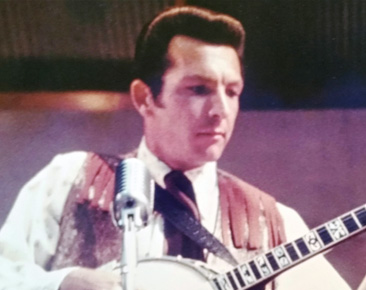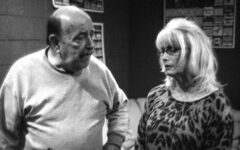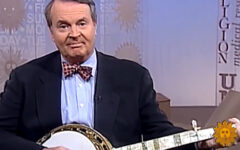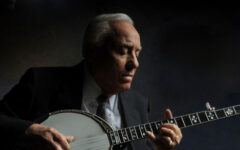
 Victor Howard Jordan passed away on August 26, 2016, in Nashville. He had been seriously ill for some time.
Victor Howard Jordan passed away on August 26, 2016, in Nashville. He had been seriously ill for some time.
Jordan was born October 19, 1938, a native of Washington D.C..
He did his military service in the United States Air Force.
Jordan moved to Nashville in 1964, initially working for Jimmy Martin, with whom he cut three songs, and then played with Wilma Lee and Stoney Cooper before joining Bill Monroe and the Blue Grass Boys in the summer of 1967. He recorded nine songs/tunes during the 18-month period that he was with Monroe.
He left the Blue Grass Boys in late February/early March 1969, and he and Roland White both decided, independently, to try out for Lester Flatt’s recently formed Nashville Grass band. He played with them until 1971, then with Jim and Jesse from 1972 through to 1974.
During his time working with Lester Flatt, Jordan composed and recorded the banjo instrumental Pickaway, a tune that has been recorded by numerous other artists. It was named after a small town in West Virginia. He was driving Lester Flatt’s bus one night and Roland White spotted the “Pickaway West Virginia” sign at three o’clock one morning and suggested that Jordan name his new banjo tune after the town.
An album named after the tune was released by Atteiram (AP I 1027) in 1973.
In 1978 he had another solo LP Banjo Nashville (Sugar Hill Records, SH 3704).
A third solo album Greatest Christmas Songs of our Land, (Power Pak PO 501, released in 1981) presented a dozen Yuletide favorites all played effortlessly on the banjo.
After leaving his job with Lester Flatt, Jordan worked as a session musician until the late 1980s.
Highlights of the 1990s include; establishing his own band, Old Hickory; in 1992, he worked as part of the show band for the Hee Haw TV show; and, later on, he worked with Wayne Newton in Las Vegas and Branson.
Subsequently, he returned to Nashville, once more working as a session musician. During this time and in the earlier period as sideman he worked with Dolly Parton, Hank Williams Jr., the Oak Ridge Boys, Jerry Reed and Loretta Lynn among others.
Jordan also played banjo on two movie soundtracks; Coal Miner’s Daughter and Smoky and the Bandit.
In 2013 Jordan was presented with the IBMA’s Distinguished Achievement Award.
David Russell is a long time Scruggs style banjo teacher, performer and writer from the Detroit area. He has toured professionally with a number of bands, and recently finished co-writing a book about Earl Scruggs, that will be released March 15, 2017. He recalls how Vic Jordan impressed him …….
“Vic Jordan has been on my list of all-time favorite banjo players since the late 1970s. Like most bluegrass banjo students, I began with Earl Scruggs, and then made my way to a number of post-Scruggs players like J. D. Crowe, Sonny Osborne, Allen Shelton, Bill Emerson, and Doug Dillard.
As time progressed I began to encounter the masters of melodic banjo, and one of the first tunes I heard, though not played melodically, was El Cumbanchero, by Vic Jordan. I thought that was the coolest tune one could play on the banjo. That was it, I had to get my mitts on as much of his music as I could find, and then I spent the next couple of years trying to figure out the subtleties of his particular style.
At that time (late 1970s) there were a number of very creative melodic players following in the footsteps of early pioneers like Bobby Thompson and Bill Keith, but Vic Jordan seemed to have that “je ne sais quoi” (please pardon the use of an overused phrase) in his playing. The way he creatively mixed Scruggs style and melodic style was what really caught my ear. His take on Train 45 simply blew my mind, as did Bluegrass Breakdown. He played with clarity, drive, and creativity in way that reminded me of Bobby Thompson and Carl Jackson, yet it was quintessential Vic Jordan.
I had the honor of interviewing Vic on March 16, 2015, for a book on Earl Scruggs that I finished co-authoring this past spring. He gladly gave me nearly three-hours of his time as I asked him about his particular take on Earl Scruggs. Here are a few of his comments about Earl Scruggs, and playing banjo from the transcript of the interview I thought you might enjoy (though the following material does not appear in the book).
‘Earl’s tone was always there, his timing was always impeccable, and his licks came out just right, all the time, whether they were back-up licks up the neck, they were just right on the money. His timing was solid as a rock. His playing was just impeccable, and it was just a joy to hear him play. I always looked forward to the next record that was coming to see what Earl was going to do next. It all goes back to Earl’s sense of timing and tone, and the way he heard a tune, but he could nail it. I think the overall sound of his playing is what catches your ear and his technique kind of catches up with you later when you study it a little bit.’
‘I always like to play a break on a song, pretty straight ahead, and then maybe put some flourishes around it, but I don’t like to get all fancy and frilly, but just drive that sucker. I always thought Allen Shelton had real good drive, a bouncy drive that would make you tap your feet, you know.’
‘I think drive is in the right hand, that’s for sure, and of course the way you make your notes with your left hand, you know, they have to be coordinated with the right hand, and you know what I’m talking about. I consider myself with drive with little flares around it, but I didn’t say flowers now I said flares [laughter].’
Here is a story Vic told about flying with Earl Scruggs.
‘We went flying together one time, you know, he was a private pilot, and I was a private pilot, and we just took a short trip. I told him that I was going to be flying around just for enjoyment, not a long trip anywhere, and he said, “Well, give me a call sometime and I’ll go with you,” and I said alright, and so I called him and told him I was going to fly to Dyersburg, Tennessee and back. He said, “Okay, I’ll meet you at the airport.” He met me at the airport, we got a plane and flew to Dyersburg and back.’ “
Earl Scruggs: Banjo Icon by Gordon Castelnero and David L. Russell, is published by Rowman & Littlefield Publishers, 256 pages, and is scheduled for a March 2017 release.







